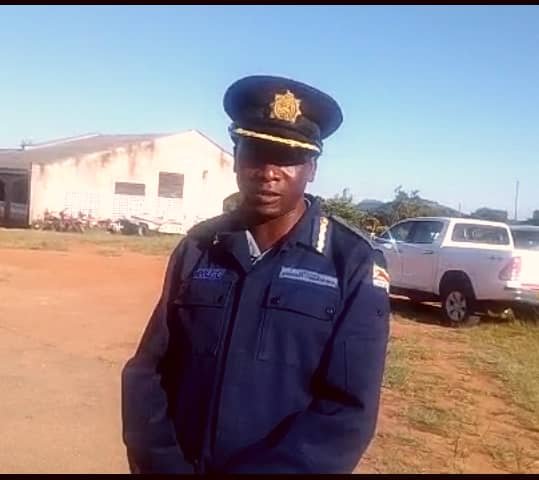Fidelicy Nyamukondiwa
Can a Supreme Court judgement be appealed?
Until
it delivers a judgement that concerns you, you may never know that the Supreme Court
can throw people under the bus. It does not however leave everyone with
goosebumps. While some will be under the bus, others will be rejoicing. This editorial explores one of the controversial
Supreme Court judgements handed down this year. It also clarifies the position
of the law with regards to whether or not a litigant can appeal against a
Supreme Court decision.
it delivers a judgement that concerns you, you may never know that the Supreme Court
can throw people under the bus. It does not however leave everyone with
goosebumps. While some will be under the bus, others will be rejoicing. This editorial explores one of the controversial
Supreme Court judgements handed down this year. It also clarifies the position
of the law with regards to whether or not a litigant can appeal against a
Supreme Court decision.
On
20 January 2020, the Supreme Court delivered a bombshell interpretation of Statutory
Instrument 33 of 2019 in the case of Zambezi
Gas Zimbabwe v N.R Barber and Anor (Zambezi Gas). This is the Supreme Court
judgment that concluded that United States dollar debts are now payable in
Zimbabwean dollars at a one to one rate.
20 January 2020, the Supreme Court delivered a bombshell interpretation of Statutory
Instrument 33 of 2019 in the case of Zambezi
Gas Zimbabwe v N.R Barber and Anor (Zambezi Gas). This is the Supreme Court
judgment that concluded that United States dollar debts are now payable in
Zimbabwean dollars at a one to one rate.
Background
information
information
On
20 February 2019, the RBZ Governor announced that local electronic balances,
bond notes and coins would become ‘RTGS dollars’ as part of the country’s multi-currency
system. He added that dollar balances in FCA Nostro accounts and mobile payment
platforms, bond notes and coins would no longer be regarded as in equal value to
US dollars. On 22 February 2019, Statutory Instruments 32 and 33 of 2019 were
passed to give effect to the Monetary Policy measures.
20 February 2019, the RBZ Governor announced that local electronic balances,
bond notes and coins would become ‘RTGS dollars’ as part of the country’s multi-currency
system. He added that dollar balances in FCA Nostro accounts and mobile payment
platforms, bond notes and coins would no longer be regarded as in equal value to
US dollars. On 22 February 2019, Statutory Instruments 32 and 33 of 2019 were
passed to give effect to the Monetary Policy measures.
Section
4(1) (d) of SI 33 of 2019 provides that; “… all
assets and liabilities that were immediately before the effective date valued
and expressed in United States dollars…shall on and after the effective date be
deemed to be valued in RTGS dollars, at a rate of one-to-one to the United
States dollar…” The
effective date referred to in the section is 22 February 2019.
4(1) (d) of SI 33 of 2019 provides that; “… all
assets and liabilities that were immediately before the effective date valued
and expressed in United States dollars…shall on and after the effective date be
deemed to be valued in RTGS dollars, at a rate of one-to-one to the United
States dollar…” The
effective date referred to in the section is 22 February 2019.
On 24 June 2019, Statutory Instrument 142 of
2019 was promulgated. This is the SI that brought an end to the multi-currency
system in Zimbabwe. It declared the RTGS dollar as the sole legal tender for
all transactions in the country. The RTGS dollar is the Zimbabwean dollar
(ZWL). On 1 August 2019, the Finance (No.2)
Act, 2019 was promulgated. Its section 23(1) is a restatement of SI 142 of
2019.
2019 was promulgated. This is the SI that brought an end to the multi-currency
system in Zimbabwe. It declared the RTGS dollar as the sole legal tender for
all transactions in the country. The RTGS dollar is the Zimbabwean dollar
(ZWL). On 1 August 2019, the Finance (No.2)
Act, 2019 was promulgated. Its section 23(1) is a restatement of SI 142 of
2019.
The Zambezi Gas case.
On 25 June 2018, Zambezi Gas
Zimbabwe Pvt Ltd (hereinafter ZGZ) was ordered by the High Court to pay USD$3 885 000(plus interests and costs of
suit) to N.R Barber Pvt Ltd (hereinafter Barber). The payment was for
services which Barber had rendered to ZGZ.
Aggrieved by the High Court’s decision, ZGZ
appealed to the Supreme Court. The latter dismissed the appeal on 13 May 2019. Eight days later, ZGZ deposited ZWL 3 885 000-00 (plus interest and costs of suit) into Barber’s bank account. In total, it paid
ZWL
4 136 806-54(including
interests and costs of suit). Barber
then queried that according to the Interbank rate, the deposited ZWL 4 136 806-54 was equivalent to only US$ 144 788-23 and hence US$3 992 018-31 was still owing. ZGZ‘s
response was that in accordance with section 4(1) (d) of SI 33 of 2019, the ZWL 4 136 806-54 was the full and final settlement of the judgment
debt.
Zimbabwe Pvt Ltd (hereinafter ZGZ) was ordered by the High Court to pay USD$3 885 000(plus interests and costs of
suit) to N.R Barber Pvt Ltd (hereinafter Barber). The payment was for
services which Barber had rendered to ZGZ.
Aggrieved by the High Court’s decision, ZGZ
appealed to the Supreme Court. The latter dismissed the appeal on 13 May 2019. Eight days later, ZGZ deposited ZWL 3 885 000-00 (plus interest and costs of suit) into Barber’s bank account. In total, it paid
ZWL
4 136 806-54(including
interests and costs of suit). Barber
then queried that according to the Interbank rate, the deposited ZWL 4 136 806-54 was equivalent to only US$ 144 788-23 and hence US$3 992 018-31 was still owing. ZGZ‘s
response was that in accordance with section 4(1) (d) of SI 33 of 2019, the ZWL 4 136 806-54 was the full and final settlement of the judgment
debt.
Barber then engaged the services of the Sheriff to attach ZGZ’s property
and sale it in a public auction to recover the ‘outstanding’ US$ 3 992 081- 31. ZGZ swiftly reacted by approaching
the High Court with an urgent chamber application for an order to suspend the
sale in execution and to declare the ZWL 4 136 806-54 as the full and final settlement of the debt in
accordance with SI 33 of 2019. The High Court dismissed the application and
ordered that the $ 4 136 806-54 be
paid in US dollars and not Zimbabwean dollars.
and sale it in a public auction to recover the ‘outstanding’ US$ 3 992 081- 31. ZGZ swiftly reacted by approaching
the High Court with an urgent chamber application for an order to suspend the
sale in execution and to declare the ZWL 4 136 806-54 as the full and final settlement of the debt in
accordance with SI 33 of 2019. The High Court dismissed the application and
ordered that the $ 4 136 806-54 be
paid in US dollars and not Zimbabwean dollars.
This prompted ZGZ to
take the matter back to the Supreme Court on appeal. It was then that the
Supreme Court was called upon to interpret
section 4(1) (d) of SI 33 of 2019 and
determine whether ZGZ was supposed to pay US$ 4 136 806-54 or ZWL 4 136 806-54. The Supreme Court allowed the appeal. It ruled in
favour of ZGZ and declared that in terms of SI 33 0f 2019, the deposited ZWL 4 136 806-54 was enough to settle the
debt.
take the matter back to the Supreme Court on appeal. It was then that the
Supreme Court was called upon to interpret
section 4(1) (d) of SI 33 of 2019 and
determine whether ZGZ was supposed to pay US$ 4 136 806-54 or ZWL 4 136 806-54. The Supreme Court allowed the appeal. It ruled in
favour of ZGZ and declared that in terms of SI 33 0f 2019, the deposited ZWL 4 136 806-54 was enough to settle the
debt.
Analysis and implications of the case.
One
man’s meat is another man’s poison. The Zambezi gas case is meat for debtors
and poison for creditors. The Zambezi Gas
case did not change the law regarding the settling of USD debts in Zimbabwe. As
hinted earlier on, what the Supreme Court did on 20 January 2020 was to give
meaning to section 4(1) (d) of SI 33 of 2019.
man’s meat is another man’s poison. The Zambezi gas case is meat for debtors
and poison for creditors. The Zambezi Gas
case did not change the law regarding the settling of USD debts in Zimbabwe. As
hinted earlier on, what the Supreme Court did on 20 January 2020 was to give
meaning to section 4(1) (d) of SI 33 of 2019.
Of much relevance is its interpretation of the
phrase ‘immediately before’. The Supreme Court elaborated that ‘immediately
before’ does not mean ‘immediately before’ in the essence of time. At page 11
of the cyclostyled judgement, the Honourable Mr Chief Justice Luke Malaba explained
that “The issue of the time-frame within which the liability arose in relation
to the effective date of 22 February 2019 does not matter. What is of
importance is the fact that the liability should have been valued before the
effective date in United States dollars and was still so valued and expressed”.
phrase ‘immediately before’. The Supreme Court elaborated that ‘immediately
before’ does not mean ‘immediately before’ in the essence of time. At page 11
of the cyclostyled judgement, the Honourable Mr Chief Justice Luke Malaba explained
that “The issue of the time-frame within which the liability arose in relation
to the effective date of 22 February 2019 does not matter. What is of
importance is the fact that the liability should have been valued before the
effective date in United States dollars and was still so valued and expressed”.
The meaning of section 4(1) (d) of SI 33 of 2019 as interpreted by
the Supreme Court is that as long as a debt or an asset (valued and expressed
in USD) existed before 22 February 2019, such debt or asset would be regarded
or considered to be valued as Zimbabwean dollars at a rate of 1 RTGS dollar to 1 US Dollar.
the Supreme Court is that as long as a debt or an asset (valued and expressed
in USD) existed before 22 February 2019, such debt or asset would be regarded
or considered to be valued as Zimbabwean dollars at a rate of 1 RTGS dollar to 1 US Dollar.
If therefore you had sold your house to John Doe for US$50 000 on 21 February 2019 (or any
date before that) and he had only
paid US$10 000 as at 22 February
2019, the amount that John Doe is entitled to pay to settle the debt in full would
be ZWL $40 000. Simply put, the
house is considered to be valued at ZWL
50 000 with effect from 22 February 2019.
date before that) and he had only
paid US$10 000 as at 22 February
2019, the amount that John Doe is entitled to pay to settle the debt in full would
be ZWL $40 000. Simply put, the
house is considered to be valued at ZWL
50 000 with effect from 22 February 2019.
Many would reason that a conversion of the US currency to Zimbabwean
currency at a one to one rate amounts to a lesser value in Zimbabwean dollars. The
fulcrum of Barber’s argument in the case was that a declaration to offset the
debt in Zimbabwean dollars at a one to one rate would result in a US$ 3.9million
loss. The Chief Justice however remarked that such a reasoning ‘is wrong at
law’. It is no doubt that the Supreme Court’s decision is ‘poison’ to Barber
and any other creditors who are owed substantial sums of money. Section 4(1) (d)
of SI 33 of 2019 is no doubt the worst nightmare for creditors in Zimbabwe. For ZGZ and similar debtors, SI 33 of 2019 is
good news.
currency at a one to one rate amounts to a lesser value in Zimbabwean dollars. The
fulcrum of Barber’s argument in the case was that a declaration to offset the
debt in Zimbabwean dollars at a one to one rate would result in a US$ 3.9million
loss. The Chief Justice however remarked that such a reasoning ‘is wrong at
law’. It is no doubt that the Supreme Court’s decision is ‘poison’ to Barber
and any other creditors who are owed substantial sums of money. Section 4(1) (d)
of SI 33 of 2019 is no doubt the worst nightmare for creditors in Zimbabwe. For ZGZ and similar debtors, SI 33 of 2019 is
good news.
Is the Supreme Court’s decision final?
The Supreme Court is the final court of appeal in cases other than
those which the Con-court has jurisdiction. The Con-court has jurisdiction over
constitutional and other specified matters. It is therefore permissible to appeal the
decision of the Supreme Court. A litigant can appeal against a Supreme Court
decision if and only if the appeal is on a constitutional issue.
those which the Con-court has jurisdiction. The Con-court has jurisdiction over
constitutional and other specified matters. It is therefore permissible to appeal the
decision of the Supreme Court. A litigant can appeal against a Supreme Court
decision if and only if the appeal is on a constitutional issue.
An Application for direct access to the Con-court is sanctioned by
section 167(5) of the Constitution and Part IV of the Con-Court Rules (SI 61 of
2016). Part V of the Rules provides for appeals to the Concourt. Rule 32(2) states
that a litigant who is aggrieved by the decision of any lower court (including
the Supreme Court) and who wishes to appeal on a constitutional matter must seek
leave to appeal. Leave to appeal simply means permission to appeal. The leave
to appeal must be filed to the Registrar of the Con-court within 15 days of the
decision to be appealed.
section 167(5) of the Constitution and Part IV of the Con-Court Rules (SI 61 of
2016). Part V of the Rules provides for appeals to the Concourt. Rule 32(2) states
that a litigant who is aggrieved by the decision of any lower court (including
the Supreme Court) and who wishes to appeal on a constitutional matter must seek
leave to appeal. Leave to appeal simply means permission to appeal. The leave
to appeal must be filed to the Registrar of the Con-court within 15 days of the
decision to be appealed.
Conclusion
It is a fact that United States dollar debts incurred prior to 22
February 2019 are now payable in Zimbabwean (RTGS) dollars at a rate of 1 US$ to 1 ZWL. In Zambezi Gas, the Supreme Court concluded that it is ‘wrong at
law’ to reason that a conversion of a foreign currency denomination to a
local currency denomination amounts to a lesser value
in the local currency.
February 2019 are now payable in Zimbabwean (RTGS) dollars at a rate of 1 US$ to 1 ZWL. In Zambezi Gas, the Supreme Court concluded that it is ‘wrong at
law’ to reason that a conversion of a foreign currency denomination to a
local currency denomination amounts to a lesser value
in the local currency.
That section
4(1) (d) of SI 33 of 2019 is a welcome development for debtors and a nightmare for
creditors is indubitable. As long as the Supreme Court decision in Zambezi Gas is not successfully
appealed or as long as the constitutionality of SI 33 of 2019 is not
successfully challenged, US dollar debts will remain payable in Zimbabwean
dollars at a one to one rate.
4(1) (d) of SI 33 of 2019 is a welcome development for debtors and a nightmare for
creditors is indubitable. As long as the Supreme Court decision in Zambezi Gas is not successfully
appealed or as long as the constitutionality of SI 33 of 2019 is not
successfully challenged, US dollar debts will remain payable in Zimbabwean
dollars at a one to one rate.
Fiat
Justitia Ruat Caelum!
Justitia Ruat Caelum!







